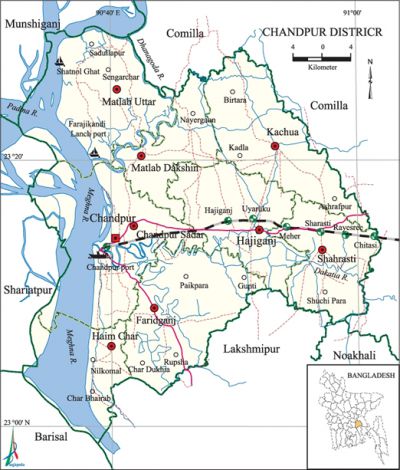Chandpur District
Chandpur District (chittagong division) area 1645.32 sq km, located in between 23°00' and 23°30' north latitudes and in between 90°32' and 91°02' east longitudes. It is bounded by munshiganj and comilla districts on the north, noakhali, lakshmipur and barisal districts on the south, Comilla district on the east, meghna river, shariatpur, and Munshiganj districts on the west.
Population Total 2416018; male 1145831, female 1270187; Muslim 2269246, Hindu 145551, Buddhist 110, Christian 423 and others 688.
Water bodies Main rivers: Meghna, dakatia, gumti, Dhanagada river and Ghorgaon Jala are notable.
Administration Chandpur sub-division was established in 1878 and was included in Tripura district. It was turned into a district in 1984.
| District | |||||||||
| Area (sq km) | Upazila | Municipality | Union | Mouza | Village | Population | Density (per sq km) | Literacy rate (%) | |
| Urban | Rural | ||||||||
| 1645.32 | 8 | 7 | 87 | 971 | 1230 | 435724 | 1980294 | 1468 | 56.8 |
| Others Information of District | ||||||||
| Name of upazila | Area (sq km) | Municipality | Union | Mouza | Village | Population | Density (per sq km) | Literacy rate (%) |
| Kachua | 235.81 | 1 | 12 | 159 | 232 | 382139 | 1621 | 53.8 |
| Chandpur Sadar | 308.77 | 1 | 14 | 136 | 112 | 465919 | 1509 | 56.1 |
| Faridganj | 232.22 | 1 | 15 | 161 | 161 | 396683 | 1708 | 58.1 |
| Matlab Uttar | 260.29 | 1 | 14 | 135 | 251 | 292057 | 1122 | 54.4 |
| Matlab Dakshin | 129.32 | 1 | 6 | 77 | 97 | 210050 | 1624 | 56.7 |
| Shahrasti | 154.81 | 1 | 9 | 152 | 163 | 229118 | 1480 | 62.7 |
| Haimchar | 134.16 | - | 6 | 28 | 65 | 109575 | 817 | 48.1 |
| Hajiganj | 189.90 | 1 | 11 | 122 | 149 | 330477 | 1740 | 60.6 |
Source Bangladesh Population Census 2011,Bangladesh Bureau of Statistics.

War of Liberation A large area of Chandpur district (bout 1200 squre miles) ranging from Shuchipara of Shahrasti Upazila to the low lying belt of Faridganj was free of Pak army during the nine months of the War of Liberation. The area was controlled by mass people fighting in resistance. Freedom fighters of the district fought against Pak army in a number of places of the Sadar upazila of the district and some other upazilas beyond its boundaries. Mass killing sites had been discovered at Raghunathpur Bazar (Hajiganj), Hamidia Jute Mills Compound, North and south Ray Sree and there is a mass grave at Nasircourt (Hajiganj). A number of memorial monuments (such as "Aungikar" meaning Oath and “Amra Tomader Bhulbana” meaning we won’t forget you at Faridganj, "Dipta Bangladesh" meaning enlightened Bangladesh at Matlab and one at Chandrakandi of Sadullahpur, Matlab.
Literacy rate and educational institutions Average literacy 56.8%; male 56.1%, female 57.3%. Educational institution: college 47, primary teachers training institute 1, secondary school 240, kindergarten 11, primary school 1470, mass education school 76, BRAC school 28, community school 93, satellite school 37, madrasa 1167. Noted educational institutions: Zelani Chisti College Faridganj Degree College, Haimchar Degree College, Puran Bazar Degree College, Hajiganj Model College, Matlab College, Hossain Ali Govt. High School, Chandpur Govt. Technical High School, Janata High School, Puran Bazar Girls High School, Char Kalia High School, Naobhanga Joypur High School, Fathepur Abul Hosan High School, Narayanpur Junior Girls High School, Hajiganj Pilot High School, Sachar Multilateral High School, Shahrasti Model School, Amanullah Govt. Primary School, Paikdi Govt. Primary School, Purbo Jafarabad Govt. Primary School, Modhya Raghunathpur Govt. Primary School.
Main sources of income Agriculture 44.42%, non-agricultural labourer 3.12%, industry 0.91%, commerce 16.17%, transport and communication 3.05%, service 13.24%, construction 2.27%, religious service 0.40%, rent and remittance 4.35% and others 12.07%.
Newspapers and periodicals Dailies: Chandpur Kantha, Chandpur Darpan, Chandpur Probaho, Alokito Chandpur, Illshepar; Weeklies: Chandpur, Chandpur Sangbad, Rupasi, Dibachitra, Hajiganj, Rupali Chandpur, Diba Kantha, Matlab Kantha; Defunct: Nababanga (1947), Alo (1947), Weekly Annagram (1960), Bharat Hitashi, Rakta Palash, Raktim Surya and Mohana.
Folk Culture The distinctive folk literature of Chandpur is mainly an indistinguishable part of that of the greater Comilla district. It includes folk tales, ballads, legends, historical tales, ballads-songs,' upakatha-rupkatha (fairy tales), sloka, spiritual songs, proverbs, Panchali gazir bot, jatra, kavigan etc. Folk games and sports include Ha-du-du, Dariyabanda, gollachhut, dang-guli, kadikkhela, Lai khela, Bauchhi, kanamachhi, kamalachuri, baghbandi, panchghunti, solaghunti, marbel khela, kari khela, kathi khela, kumari khela, spinning of latim, ekka-dokka, etc. Most of these games and sports are now either extinct or nearly extinct. Besides, a number of theatre groups occasionally perform staging of drama.
Tourist spots District Illish Chattor, Shaharpar Dighi, Shibganj Nil Kuthi, Rupsha Zamindar Bari, Sree Sree Jagannath Mandir. [Abul Khaer Khan]
See also Upazilas of the district.
References Bangladesh Population Census 2001 and 2011, Bangladesh Bureau of Statistics; Cultural survey report of Chandpur District 2007; Cultural survey report of upazilas of Chandpur district 2007.
